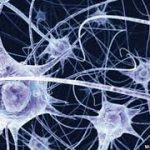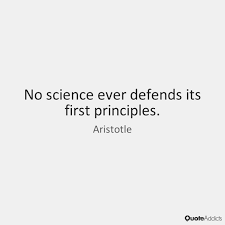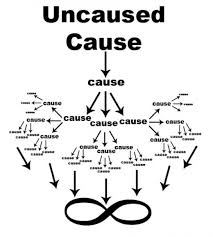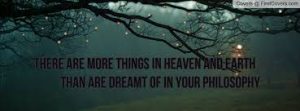Each of us can point to a time (or several times) in our past when we made a decision that, in retrospect, significantly shaped our lives going forward. Such decisions for me include getting married at one month past twenty, choosing to leave law school for a masters program in philosophy, and deciding to commit for life in my early thirties to a person whom I had known for six weeks. I could have chosen differently in each of these cases, and my life would be much different now than it is.  B
B ut could I really have chosen otherwise? The answer of many “experts” from psychology, science, philosophy, and more is “no.”
ut could I really have chosen otherwise? The answer of many “experts” from psychology, science, philosophy, and more is “no.”
I wrote about how the “experts” have gradually but inexorably come to this conclusion a week ago, describing how evidence from Darwin to neuroscience supports the conclusion that everything about me, including all of my choices, is fully determined by both biological and environmental causes beyond my control.
I undoubtedly, the experts admit, will continue to believe that some of my choices are free in the sense that I could have chosen otherwise, but that belief is based on an illusion.  My choices may feel free, but they really aren’t. If true, the news that free will—the foundation of what most of us believe concerning morality, reward, punishment, praise, blame, and responsibility—is an illusion cannot be taken lightly. Nor, I would argue, need I either as a philosopher or a human being believe that the “experts” are right about this. Free will is only an illusion if one accepts the starting assumptions that energize the argument against human beings having real free will, assumptions that include the belief that everything that exists is made of physical matter, that physical matter is governed by inexorable physical laws, and that we generally know what those laws are. These assumptions are so entrenched among the “experts” that challenging them is as uphill a battle as trying to argue that the earth is flat. But I’ll give it a shot.
My choices may feel free, but they really aren’t. If true, the news that free will—the foundation of what most of us believe concerning morality, reward, punishment, praise, blame, and responsibility—is an illusion cannot be taken lightly. Nor, I would argue, need I either as a philosopher or a human being believe that the “experts” are right about this. Free will is only an illusion if one accepts the starting assumptions that energize the argument against human beings having real free will, assumptions that include the belief that everything that exists is made of physical matter, that physical matter is governed by inexorable physical laws, and that we generally know what those laws are. These assumptions are so entrenched among the “experts” that challenging them is as uphill a battle as trying to argue that the earth is flat. But I’ll give it a shot.
I often tell my students that each person, among her or his beliefs, has a small handful of what Aristotle called “first principles.” Aristotle knew as much about cause and effect as anyone;ō indeed, he arguably invented our familiar system of logic that is built on the belief that we live in a world governed by cause and effect relationships. These relationships shape how our beliefs hang together as well. Consider the following conversation:
Me: I believe A is true.
You: Why?
Me: Because A depends on B, and I believe B is true.
You: Why?
Me: Because B depends on C, and I believe C is true.
You: Why?
There’s a pattern here. We all seek to support our beliefs by referring to connected and deeper beliefs on which they depend. There’s also a problem here, though. The chain of cause and effect has to end somewhere if we are to avoid the dreaded “infinite regress.” So eventually we get this:
Me: I believe that X is true because X depends on Z, and I believe Z is true.
 You: Why? (you’re getting really annoying, by the way)
You: Why? (you’re getting really annoying, by the way)
Me: Because I do.
In Aristotle’s terminology, I have just identified “Z” as one of my first principles. In order to avoid an infinite regress, eventually we arrive at a belief for which we seek no further justification than that we believe it. Such first principles vary from person to person–some common ones include “Human life is intrinsically valuable,” “Human beings are fundamentally equal,” and “Do unto others as you would have them do unto you.” For many, including myself, “Human beings have the capacity to choose freely, choices that are not entirely determined by matters outside their control” is another first principle which, if true, stands in direct opposition to what the “experts” claim the truth to be. And like it or not, no one wants to hear that a first principle is an illusion.
When I choose freely, I deliberate between available options, weigh the evidence supporting and against each, and choose the option that best satisfies my operational criteria. I cause the choice, in other words, influenced but not determined by any number of factors. This simple idea—that a human being can choose without the choice being fully determined—violates assumptions so prevalent among the “experts” that it is tantamount to heresy.  And to be sure, this simple idea is indeed a radical one, for it claims that the freely choosing human being is an exception to the inexorable laws of matter, capable of starting her or his own chain of causation that would not have happened without the choice starting the chain. There are few beings in the annals of philosophy with this power. Aristotle called his creating force—what we might call “God”—the “unmoved mover” or “the first cause uncaused,” the place where the chain of causation begins (or ends if one is going backwards). In short, human beings act “in loco parentis,” with the causal power of the divine itself, when we make free choices. If one wants to go religious, it is this very creative power of free choice that the sacred texts are referring to when they claim that human beings are “created in the image of God.”
And to be sure, this simple idea is indeed a radical one, for it claims that the freely choosing human being is an exception to the inexorable laws of matter, capable of starting her or his own chain of causation that would not have happened without the choice starting the chain. There are few beings in the annals of philosophy with this power. Aristotle called his creating force—what we might call “God”—the “unmoved mover” or “the first cause uncaused,” the place where the chain of causation begins (or ends if one is going backwards). In short, human beings act “in loco parentis,” with the causal power of the divine itself, when we make free choices. If one wants to go religious, it is this very creative power of free choice that the sacred texts are referring to when they claim that human beings are “created in the image of God.”
The position that truly free choices step meaningfully outside the laws of nature has been called “metaphysically peculiar” by some philosophers, simply “bullshit” by others. Free will deniers assume that any human capacity that purportedly steps outside the laws of physical matter must be an illusion, since we all know that everything is made of matter and that matter is governed by deterministic laws.  To which I respond, as I often do, in the words of Shakespeare’s Hamlet: There are more things in heaven and earth . . . than are dreamt of in your philosophy. Presuming that everything in heaven and earth can be reduced to the confines of our current understanding of reality is hubris of breathtaking proportions. When a fundamental and definitive human ability is defined out of existence because of narrow assumptions, I choose to question the assumptions rather than the reality of the fundamental human ability. When answers to a question do not square with our strongest intuitions and beliefs about ourselves, change the question.
To which I respond, as I often do, in the words of Shakespeare’s Hamlet: There are more things in heaven and earth . . . than are dreamt of in your philosophy. Presuming that everything in heaven and earth can be reduced to the confines of our current understanding of reality is hubris of breathtaking proportions. When a fundamental and definitive human ability is defined out of existence because of narrow assumptions, I choose to question the assumptions rather than the reality of the fundamental human ability. When answers to a question do not square with our strongest intuitions and beliefs about ourselves, change the question.
None of the above is very philosophical of me, at least not in the contemporary sense. I freely (J) admit that human free choice might be an illusion, but I see no reason to believe so based on an argument with questionable assumptions. I choose rather to embrace the mystery and miracle of being human and believe, until better contrary evidence is provided, in keeping with the intuitions of billions of human beings that at least some human choices make a difference—such a great difference that they make the world a different place than it would have otherwise been.  And human beings are not just vehicles of that change—their choices cause that change. Maybe we just don’t know enough about reality to rule out abilities that don’t square with our current understanding of things. Maybe human beings are truly the crowning glory of creation, endowed with a spark of the divine that reveals itself in our most basic capacities. Maybe all of the above. Take your pick. As Jean-Paul Sartre used to say, “You are free, therefore choose.”
And human beings are not just vehicles of that change—their choices cause that change. Maybe we just don’t know enough about reality to rule out abilities that don’t square with our current understanding of things. Maybe human beings are truly the crowning glory of creation, endowed with a spark of the divine that reveals itself in our most basic capacities. Maybe all of the above. Take your pick. As Jean-Paul Sartre used to say, “You are free, therefore choose.”












